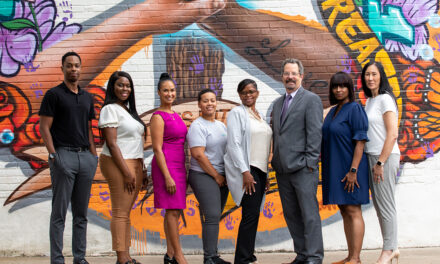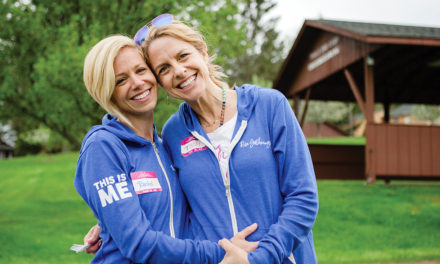An unforgettable conversation between a mother-daughter that left us (and them) tear-stained and emotionally drained (and reminded us to call our moms).
I realize I’m one of the lucky ones when I say this: I don’t just love my mom; I actually, genuinely, like her. We never went through that phase when I was a teenager when I hated her. When I’m feeling down, just hearing her voice makes me melt into tears. When something amazing happens, she’s one of the first people I call. And yet, at 38, I realized there’s so much ground we’ve never covered—everything from how much intention she put into what kind of mom she wanted to be to who her favorite daughter is between my little sister, Maureen, and me (I knew she’d never fess up). Here’s the conversation that left us tear-stained and emotionally drained and that, incredibly, brought us even closer.
Q: How did your experience growing up in your own family influence the family you created with dad?
A: I was raised in a classic late-1950s, 1960s home where gender roles were more defined than they are now, and more restrictive. My parents were dedicated to each other and to my brothers and me, and they came to this country from Ireland specifically to work hard and give us a better life. Dad had a similar upbringing, and we decided that we wanted you and your sister to know us more. We wanted to create an environment where you felt comfortable expressing your feelings, and we wanted you to know us as people.
Q: What did your mother teach you about being a mom?
A: My mom was a uniquely strong individual. She was a take-charge, get-it-done-and-do-it-right kind of mom. If you faced a setback, you carried on. “Come hell or high water, we’ll do this”—that was one of her favorite phrases. She also had strong opinions. She wasn’t a typical mother and wife in the 1950s in that regard. I loved seeing that strength and always knew I had that in me too, but when I became a mom, I wanted to try to be a little softer around the edges.
Q: Research says every parent has a favorite. Come clean: Is it me or Maureen?
A: This is an impossible question for me to answer. It’s like asking me what is my favorite essential internal organ: my heart or my lungs? That is the truth, Meghan. As a mother, I just can’t make that choice. And furthermore, I question the validity of the question.
Q: What do you think has been your biggest failure as a mom, and how have you forgiven yourself for that?
A: I sometimes—alright, I never—wanted to show the cracks in my armor. So I didn’t. I cut myself some slack for this when you were young because I wanted you to know your world was safe, happy, and secure. But as you got older, I think I did you an injustice by not letting you see if I was sad or stressed. Now, looking back, I think I may have embraced those times as teaching moments.
There’s also one moment in particular that stands out, which taught me that my expectations for you may differ, sometimes greatly, from your aspirations. When you got into Cornell, I was so proud that you’d gotten into an Ivy League school. I wanted that for you. Remember, I’m the daughter of immigrants; this was an opportunity I didn’t know how you’d say no to, because of all it represented. I wasn’t as good as your dad in trusting that, on some level, you knew going to Cornell wasn’t right for you. And you thrived at the University of Delaware academically and socially.
I learned from that, and when decisions later in your life came up that we talked about—like you leaving a great job in New York City to move out west—I trusted you.
Q: You once told me that you see Dad as your no. 1. I think a lot of women would find that controversial, or at least surprising.
A: Nobody can dispute that your life changes once you have kids. It has to. But what doesn’t have to change, if you make the effort, is your identity as a couple. And it’s a lot easier to create a solid family when you don’t lose sight of that connectedness and your relationship as a couple.
Here’s what I say to the naysayers: I think of my relationship with your dad as the foundation on which we built this family. You just don’t pour that cement and hope everything is fine for the next 30 years, right? You peek into the dark corners and say, “Uh-oh, we’ve got to fix that.” It’s not that we made a choice that we were more important in each other’s lives than you girls, and it’s not that I love dad more. It’s more that I prioritize that relationship because I believe the two people who created the family are the most important figures.
Q: You and Dad have been married for 40 years, and you’ve got a pretty amazing relationship. Do you think that has set the bar too high for me?
A: I wouldn’t say the bar is too high. I think you saw the qualities of a loving relationship when you were growing up, and now you know what’s going to make you happy. I like to think you and Maureen have benefitted from seeing how dad and I work together.
Q: If you could go back to your hospital bed right after you had me, what is one piece of advice you’d give yourself that would help you through motherhood?
A: This is my favorite question, because it’s prompting me to go back to those moments after I had you and Maureen, and I can viscerally remember the experience of giving birth to each of you. Here’s my advice for my younger self: When you’re knee-deep in dirty diapers and feedings and laundry and carpools, try to remember the overwhelming joy you’re feeling right now, in this moment when the nurse is handing you a human being that you created. It’s easy to get caught up in the minutia and lose sight of the immense gratitude you feel for being a mom.
Q: What do you think is the single trait that defines you as a mother?
A: My willingness to nurture. I’m good at it. I think I was blessed to have this ability to nurture in my DNA; I think I was born to be a mother. It’s definitely the thing I’m most proud of. Sure, I ran a successful business. It’s not that I was this stay-at-home, Donna Reed–type mother. But I genuinely wanted my main focus to be as a support for you girls. Quite simply, I think the way I loved you defines me as a mother. If you can teach your children love above all else, then you’ve described motherhood for me.
Q: Maureen and I have learned so much from you. What have you learned from us?
A: I’ve learned there’s a unique kind of love you experience as a mother. Nobody can prepare you for the depth of that emotion. When you take complete responsibility for another life, you get to know that person, and you continue learning more about yourself and your kids—always. It’s like waves that keep crashing on the shore; eventually, they form the landscape of your life.
Q: What went through your head when we left for college, and you and Dad had the house to yourselves?
A: In no particular order, here’s what I thought: Wow, that went fast. Boy, the house seems quiet. I guess we did our job; they’re supposed to leave.
You know what I realize now, though? You never leave—and I don’t mean physically. Every time I turn around in the house, there are so many memories. I still remember the constellation of glow-in-the-dark stars on the ceiling that took us 3 days to peel off. I still see the hole you put in the hallway—even though it’s long been patched up—when you were pretending to be Debbie Thomas and jammed your heel through the wall after trying a triple axel. I can’t bring myself to take down your Irish dancing shoes hanging in the basement, which I see every time I do laundry. You kids never leave. You’re here. Always.





